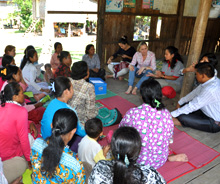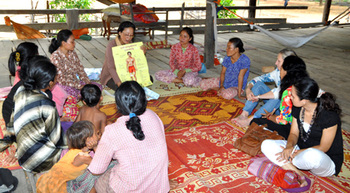Access to Justice for Women II
Project description
Title: Access to Justice for Women II
Commissioned by: German Federal Ministry for Economic Cooperation and Development (BMZ)
Country: Cambodia
Lead executing agency: Ministry of Women’s Affairs, Cambodia
Overall term: 2014 to 2016

Context
Violence against women remains a significant development barrier in Cambodia. Although the country has a formal judicial system and existing laws that guarantee gender equality, the state seldom provides effective protection or legal support to women and girls affected by gender-based violence. At the local level in particular, women and girls who experience domestic or sexual violence are often left to fend for themselves.
There is too little access to free or low-cost legal advice and psychosocial services, and the quality of the services that are available is inadequate, especially for women living in rural areas and those with disabilities. Women who are victims of rape are often stigmatised and ostracised by community members. Village leaders, police and other local authorities conduct informal mediations between perpetrators and the victims’ families, often neglecting rights and dignity of the women themselves, or their capacity for self-determination. Court proceedings are complicated and usually time-consuming.
Objective
The quality of services for female victims of gender-based violence, especially sexual and physical abuse, and the access to such services, are increasingly able to meet the needs.
Approach
The current project builds on the results from the earlier project, ‘Access to Justice for Women I’. It encourages inter-ministerial cooperation and advises the Cambodian Ministry of Women’s Affairs on policy design and management competences for the response to gender-based violence. Government officials thereby develop enhanced capacities for designing, implementing and monitoring measures that more closely match the needs of the victims of gender-based violence.
In the target provinces of Kampong Thom and Siem Reap the project is strengthening a multi-sectoral response mechanism as a means of promoting better access to, and quality of services for women affected by gender-based violence.
A central part of the project is the involvement of non-governmental organisations (NGOs) that provide free legal assistance and psychosocial services to women and girls. A fund is used to provide financial resources for these NGOs, with which they can improve the services they provide to female victims of gender-based violence, including those with disabilities. At the same time, the project provides complementary HR development measures for governmental and non-governmental actors, for instance in the health sector.
The project is supporting its partners in their efforts to enhance an existing database of cases involving violence against women, especially sexual violence. An evidence-based system should make it possible to gather and manages such data effectively.
At the same time, the project is strengthening the coordination capacity of the Ministry of Women’s Affairs, as well as its strategic communications for the fight against gender-based violence. It is also contributing to improved communication flows and cooperation between the different stakeholders.
By the end of the project, the Ministry of Women’s Affairs, other relevant ministries and downstream authorities, and the NGOs in the two provinces should have contributed to a long-term improvement in the access to, and quality of services for women and girls affected by gender-based violence.
The project is co-financed by the Australian Government’s Department of Foreign Affairs and Trade (DFAT).
Results
In the provinces of Siem Reap and Kampong Thom, women who have experienced gender-based violence now take advantage of services that have been put in place specifically for them. They can use shelters and benefit from legal and psychosocial counselling.
More women who have experienced gender-based violence now receive legal advice and press charges against the perpetrators. The number of court cases has risen and there are now around 150 state-appointed judicial police officers who have received training from the Ministry. They are able to advise women who have suffered violence on their rights and options.
The collection of data on cases of domestic violence and rape, as well as the quality of then available support services are being improved in cooperation with the Ministry of Women’s Affairs, line ministries and respective NGOs.

In the public discourse on gender-based violence, the Ministry of Women’s Affairs now emphasises human rights, women’s empowerment and the social inclusion of vulnerable groups of women and girls, such as those with disabilities and from sexual minorities. It does this, for example, in press releases and events on the topic of violence against women, and in the National Action Plan on Violence Against Women (2014-2018).